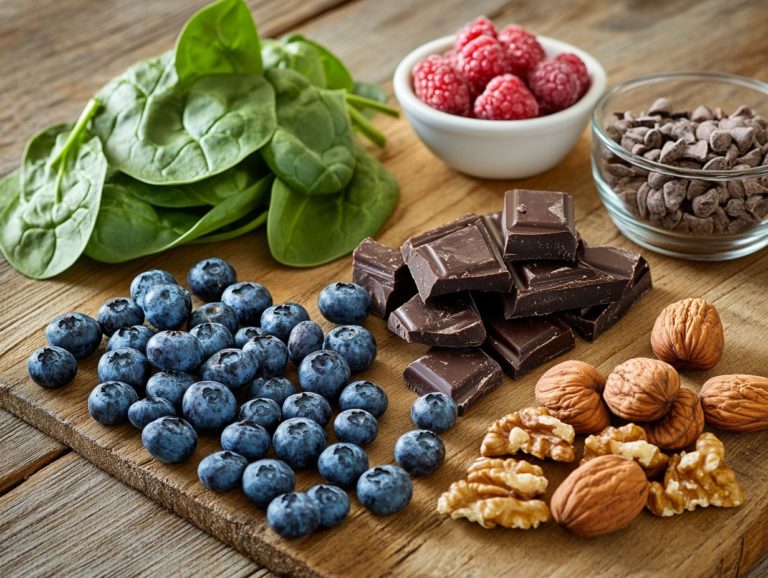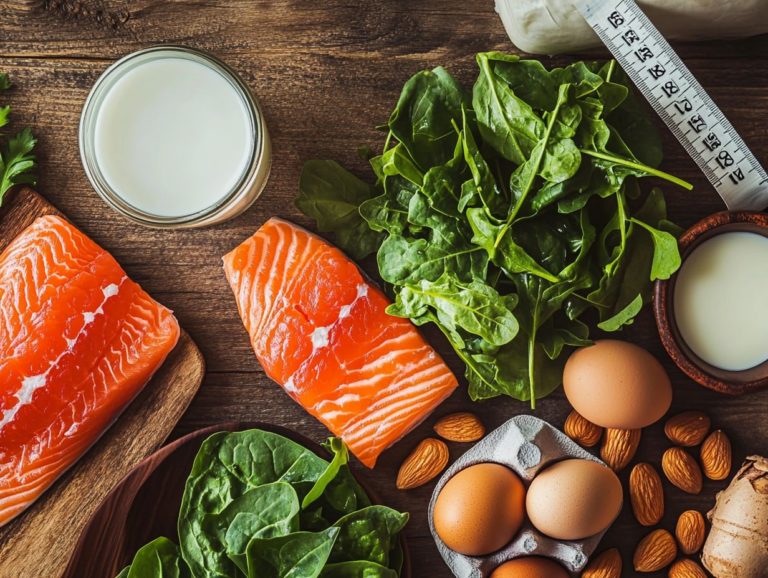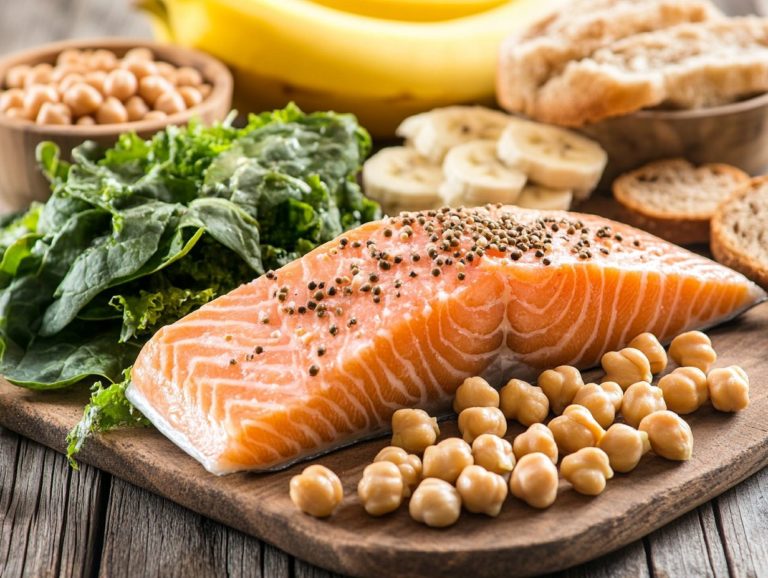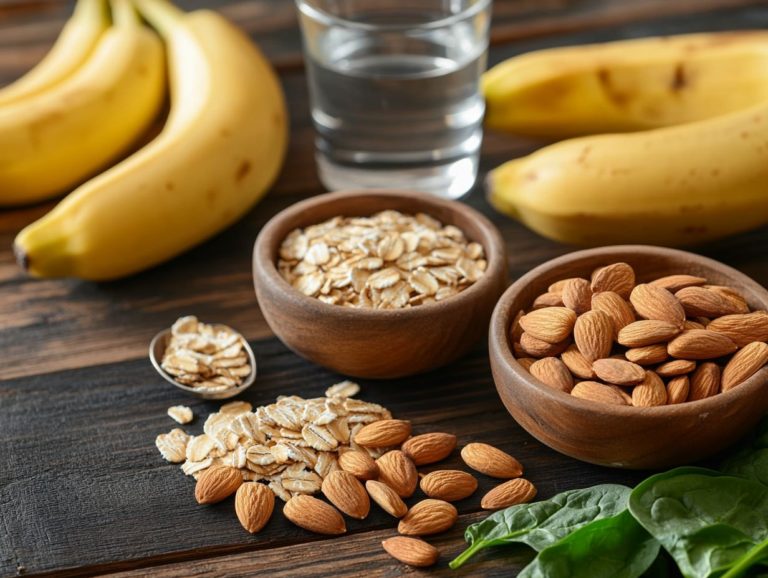Top 10 Healthy Fats for Your Daily Diet
In today s health-conscious landscape, it s easy to misinterpret the role of fats in your diet. Not all fats are created equal; some are vital for your overall health and well-being.
Get ready to find out why these fats are amazing for your health as we delve into the top ten healthy fats that can elevate your culinary experience, from luscious avocados to indulgent dark chocolate.
You ll discover what makes these fats beneficial, how to seamlessly weave them into your meals, and debunk common myths surrounding fat consumption. Prepare yourself to embrace the nourishing side of fats!
Contents
- Key Takeaways:
- 1. Avocado
- 2. Olive Oil
- 3. Nuts and Seeds
- 4. Fatty Fish
- 5. Coconut Oil
- 6. Chia Seeds
- 7. Flaxseed
- 8. Dark Chocolate
- 9. Full-Fat Yogurt
- 10. Eggs
- What Are Healthy Fats and Why Are They Important?
- Frequently Asked Questions
- What are the top 10 healthy fats for your daily diet?
- How do these healthy fats benefit your body?
- Can these healthy fats be consumed on a daily basis?
- Can these healthy fats be used in cooking?
- Are there any potential risks or side effects of consuming these healthy fats?
- Can these healthy fats be a part of a weight loss diet?
Key Takeaways:
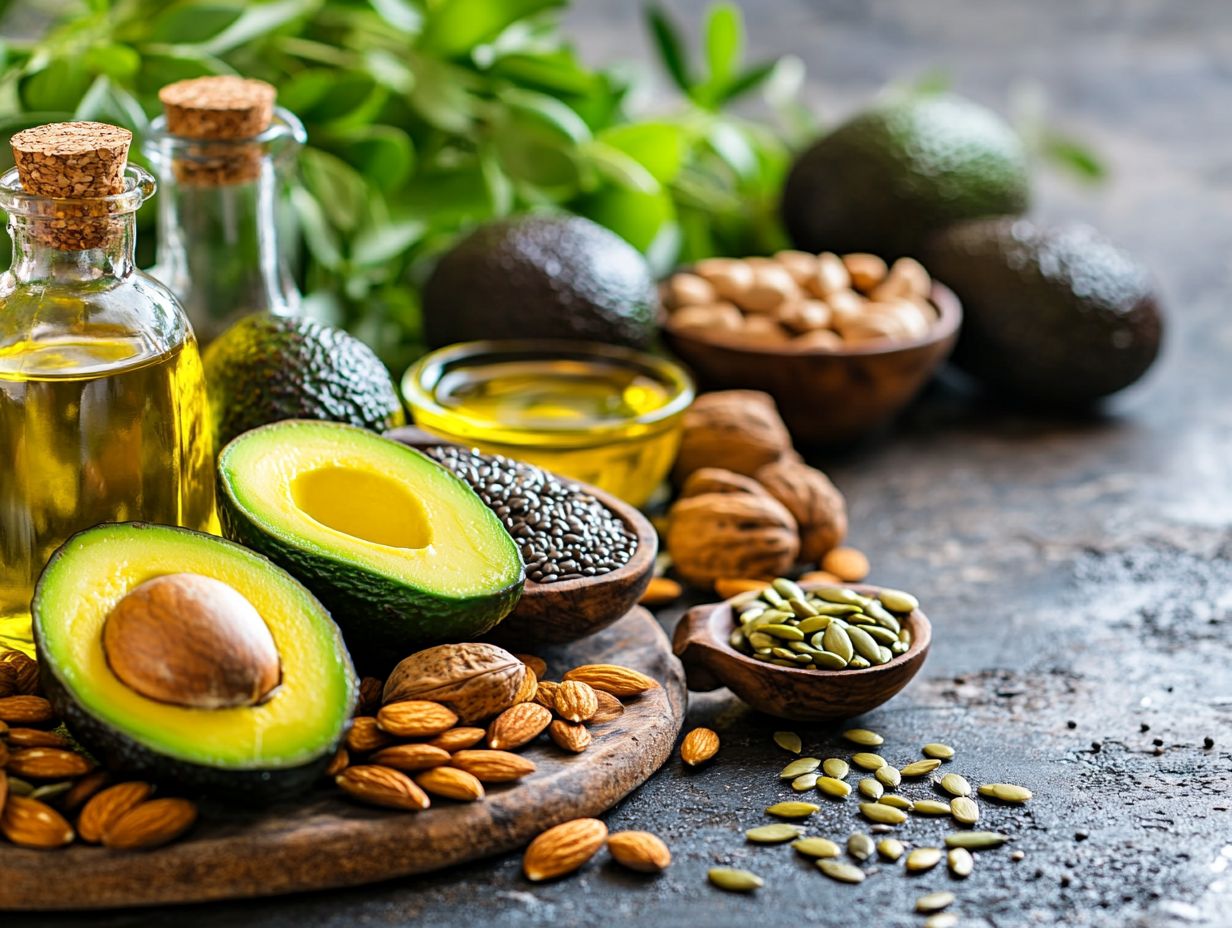
Avocado is a nutrient dense healthy fat that can improve heart health and promote weight loss. Olive oil contains monounsaturated fats that can lower cholesterol and reduce the risk of heart disease. Nuts, seeds, and fatty fish are excellent sources of healthy fats that can provide numerous health benefits, including brain and heart health.
1. Avocado
Avocados are a powerhouse of healthy fats, loaded with monounsaturated fats that significantly benefit your heart health and overall well-being. These creamy fruits deliver essential nutrients, help manage cholesterol levels, and support brain function.
As a staple in many diets, avocados can be easily integrated into your meals, enhancing both flavor and nutritional value. The American Heart Association champions their consumption as a savvy choice for enhancing your dietary fat intake while savoring delicious dishes.
Beyond their heart-healthy perks, avocados boast beneficial omega-3 and omega-6 fatty acids, which reduce inflammation and safeguard cardiovascular health. You can use avocados in many ways; slice them into salads for creaminess, blend them into smoothies for a nutrient-packed boost, or whip up rich guacamole to elevate any gathering.
Start adding avocados to your meals and support your weight management! They re satisfying and nutrient dense, helping to keep hunger at bay while maintaining a balanced diet.
2. Olive Oil
Olive oil stands out as one of the healthiest fats you can choose, brimming with unsaturated fats that support heart health and overall well-being. This liquid gold is rich in omega-3 and omega-6 fatty acids, making it a versatile cooking companion and a cornerstone of Mediterranean diets, known for promoting longevity and reducing cholesterol levels.
Its anti-inflammatory properties can enhance brain health, positioning it as an essential dietary fat that complements a wide array of dishes.
Incorporating olive oil into your daily meals is effortless and delightful. Drizzle it over salads to replace heavier dressings, allowing you to lower your saturated fat intake while adding a burst of flavor.
It s also perfect for saut ing vegetables or marinating proteins, enhancing taste while contributing to lower blood pressure when swapped for less healthy oils.
Dishes such as classic Mediterranean quinoa salad or warm roasted vegetable medley can showcase the rich, nuanced flavor of olive oil, demonstrating its versatility and impressive health benefits.
3. Nuts and Seeds
Nuts and seeds are nutrient dense foods essential for optimal heart health and overall nutrition. They provide a variety of healthy fats, particularly polyunsaturated fats that can help lower bad cholesterol.
Packed with omega-3 fatty acids, vitamins, and minerals, these small powerhouses offer a satisfying crunch along with a wealth of health benefits, including improved cholesterol levels and effective weight management.
Incorporating a mix of nuts and seeds into your diet supports brain health while enhancing your meals in a delightful way. Among the most beneficial options are:
- Walnuts, celebrated for their high omega-3 content,
- Flax seeds, which boast an abundance of lignans and fiber,
- Chia seeds, which pack a punch of nutrients and absorb liquid to create a gel-like texture that elevates smoothies or oatmeal.
By adding these seeds and nuts to salads, yogurt, or even baked goods, you can effortlessly boost your nutrient intake. Their healthy fats promote satiety, making them invaluable allies in your weight management strategies, allowing you to enjoy satisfying meals without the risk of overeating.
Dive into the world of healthy fats today and transform your meals!
4. Fatty Fish
Fatty fish, like salmon and mackerel, are known for their high omega-3 content. These essential fats promote heart health and combat inflammation.
They are treasure troves of beneficial dietary fats, offering a multitude of health benefits. These include improving cholesterol levels and enhancing brain function.
The American Heart Association recommends enjoying fatty fish at least twice a week. This helps you gain advantages like better blood pressure control and improved cognitive function.
Incorporating these delectable fish into your diet can profoundly impact your overall wellness.
Omega-3 fatty acids also promote satiety and regulate metabolism, helping with weight management. Ready to enjoy these health benefits? Try these delicious ideas:
- Grill salmon with a splash of lemon and herbs for a quick weeknight dinner.
- Whip up a tasty mackerel spread with avocado for a nutritious lunch option.
- Add fatty fish to your salads.
- Craft fish tacos.
These ideas can elevate simple meals into delightful experiences that nourish both your body and your taste buds.
5. Coconut Oil
Coconut oil is a remarkable fat, primarily made up of saturated fat, which can actually be beneficial in moderation as part of your balanced diet.
With its distinctive flavor and versatile cooking properties, coconut oil has captured attention for its potential health benefits. These benefits include boosting metabolism and supporting heart health, especially when paired with a diet rich in unsaturated fats.
Despite its saturated fat content, you can easily add it to a healthy eating plan that celebrates diverse dietary fats. Its high smoke point makes coconut oil perfect for frying and saut ing, creating flavorful meals with ease.
In baking, it lends a rich texture to treats like cookies and cakes, making it a tempting alternative to traditional oils and butter.
Many advocates rave about its medium-chain triglycerides (MCTs) a type of fat your body can use quickly for energy possibly giving you an edge in enhancing workout performance.
While coconut oil is undoubtedly valuable, remember to include it alongside a variety of other fats to maintain overall nutritional balance.
6. Chia Seeds
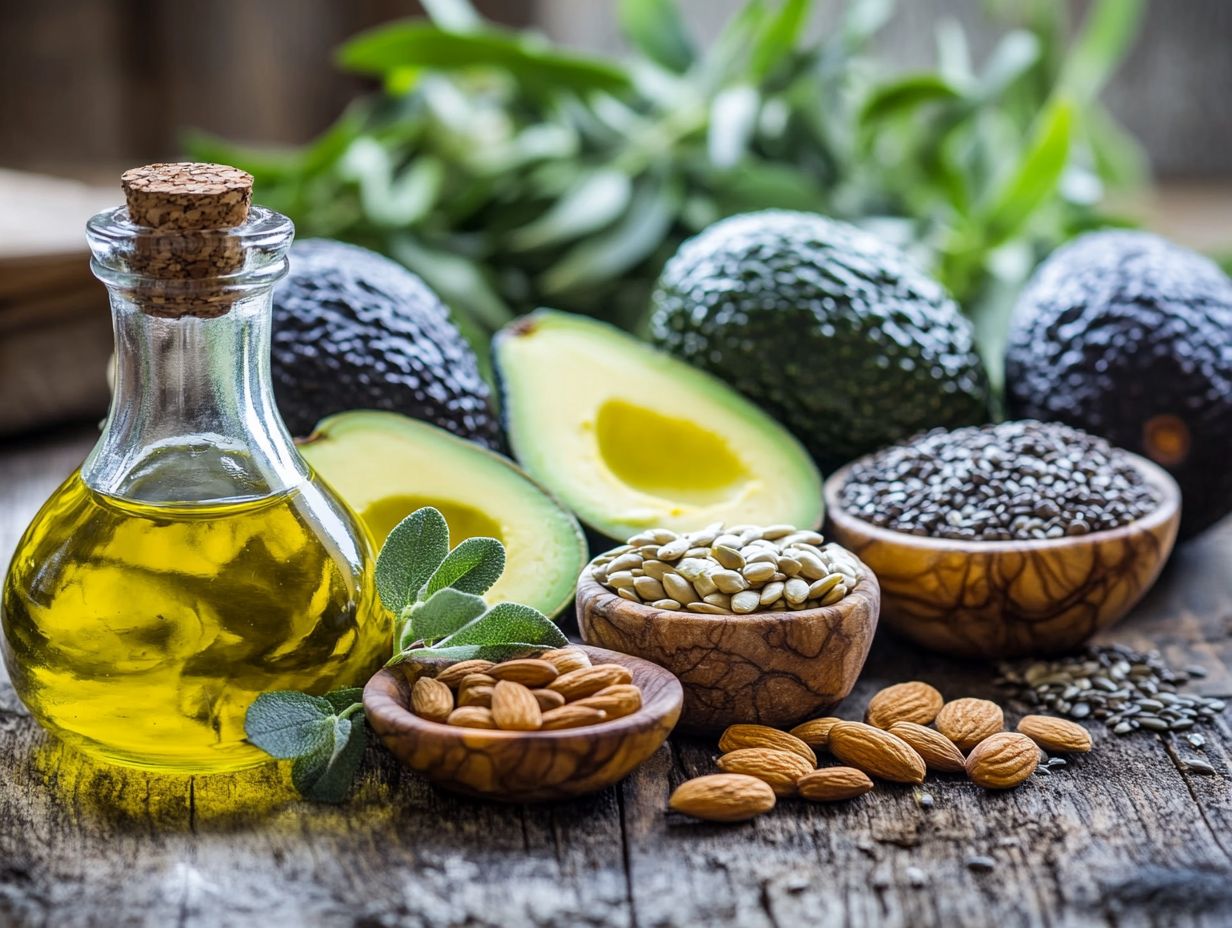
Chia seeds may be tiny, but they pack a powerful punch. They re brimming with omega-3 fatty acids and other healthy fats, offering benefits like improved heart health and enhanced brain function.
These nutrient-dense wonders are not just rich in fiber; they re also a fantastic source of plant-based protein. You can easily toss them into smoothies, sprinkle them on salads, or fold them into baked goods, elevating your meals with flavor and nutrition.
One of the most remarkable aspects of chia seeds is their ability to absorb liquid and expand, creating a gel-like consistency. This feature can help promote feelings of fullness and support weight management.
Incorporating these versatile seeds into your daily routine is a breeze. Consider:
- Sprinkling them onto your oatmeal or yogurt.
- Blending them into sauces for extra thickness.
- Using them in puddings for a nutritious dessert.
With all their diverse applications, it s clear why these little seeds are celebrated for fostering a balanced diet and supporting overall wellness.
What s your favorite way to enjoy fatty fish or chia seeds? Share your recipes with us!
7. Flaxseed
Flaxseed is a fantastic source of omega-3 fatty acids. It s essential for heart and brain health.
These tiny seeds are full of fiber and antioxidants. They offer many health benefits, including better cholesterol levels and easier weight management.
Grinding flaxseed is simple. You can mix it into smoothies, oatmeal, or yogurt for added nutrition and flavor.
If you enjoy baking, add flaxseed to muffins, bread, or pancakes for an extra health boost. Regular consumption can help manage cholesterol and improve digestion.
8. Dark Chocolate
Dark chocolate isn t just a delicious treat; it offers healthy fats and many benefits. It can boost heart health and elevate your mood.
This delightful snack is packed with antioxidants. It helps manage cholesterol levels and lower blood pressure.
Enjoy dark chocolate in moderation. Pair it with fruits or nuts for a nutritious snack.
Choose varieties with at least 70% cocoa to maximize health benefits. Just a couple of squares after a meal can help satisfy your cravings.
9. Full-Fat Yogurt
Full-fat yogurt is a creamy delight packed with healthy fats. It offers benefits that range from improved digestion to enhanced heart health, thanks to its probiotics.
This versatile dairy treat can elevate your meals and snacks while providing essential nutrients.
Incorporating full-fat yogurt into your diet can help manage cholesterol levels while satisfying your cravings for rich flavors.
Packed with probiotics, it serves as a natural ally for gut health. Use it as a base for smoothies or as a drizzle over roasted vegetables for that creamy touch.
Or enjoy it with fresh fruits and a sprinkle of nuts for a satisfying snack.
10. Eggs
Eggs are a nutrient-dense powerhouse, offering a remarkable balance of healthy fats and high-quality protein. They are essential for anyone committed to optimal health.
This incredible food provides an impressive amino acid profile along with omega-3 fatty acids that support heart health and cognitive function.
If you’re looking to incorporate eggs into your meals, try poaching or scrambling them with fresh herbs to enhance flavor.
You can also blend them into smoothies for a protein boost or bake them into a nutritious quiche packed with vegetables.
With various cooking techniques at your disposal, it s clear why eggs are the go-to choice for health enthusiasts.
What Are Healthy Fats and Why Are They Important?
Healthy fats are important components of your diet. They play a key role in maintaining overall health, especially in supporting heart health and cognitive function. These fats, which include good fats like monounsaturated and polyunsaturated fats, help regulate cholesterol levels and provide your body with vital energy.
The American Heart Association highlights the need to include healthy fats in your meals while limiting harmful trans fats and saturated fats. This balanced nutritional profile is essential for promoting wellness.
For instance, monounsaturated fats, found in olive oil, avocados, and nuts, help reduce bad cholesterol levels and lower the risk of heart disease. On the other hand, polyunsaturated fats such as omega-3 and omega-6 fatty acids found in fatty fish, flaxseeds, and walnuts are vital for brain health and reducing inflammation.
By swapping unhealthy fats like butter or margarine for these healthier options, you can significantly enhance your overall dietary quality, paving the way for improved long-term health and well-being.
What Are the Different Types of Healthy Fats?
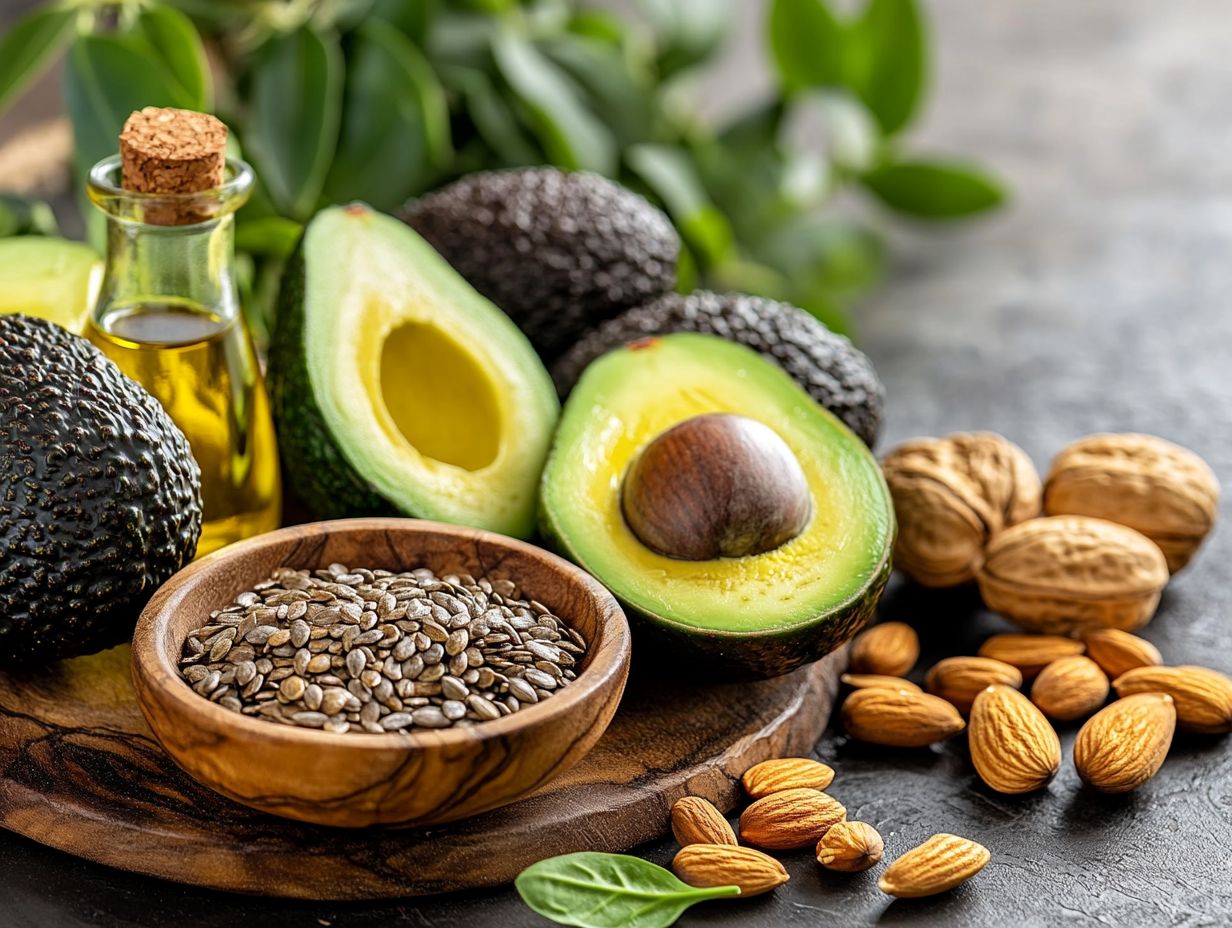
Discover the different types of healthy fats that can boost your diet. These include monounsaturated fats, polyunsaturated fats, and a limited amount of saturated fat. Understanding these distinctions is essential for making informed dietary choices.
Monounsaturated fats, abundant in foods like almonds, peanuts, and olive oil, support heart health and may help maintain healthy cholesterol levels.
Polyunsaturated fats contain essential fatty acids, such as omega-3s, found in fatty fish like salmon and walnuts. These fats are crucial for cognitive function and fostering a balanced mood.
Saturated fats, often sourced from animal products like butter and cheese, should be consumed sparingly. Recent studies suggest they can contribute to hormone regulation. Adopting a balanced approach to these fats can enhance your overall well-being.
How Can Healthy Fats Benefit Your Health?
Incorporating healthy fats into your diet unlocks essential health benefits today, from improved heart health to better cholesterol levels and enhanced brain function. Research indicates that when you consume adequate amounts of monounsaturated and polyunsaturated fats, you lower your risk of cardiovascular diseases while providing essential nutrients that support cognitive function.
These fats are also crucial for the absorption of fat-soluble vitamins, contributing to your overall wellness and vitality. Focus on nutrient-dense sources like avocados, nuts, seeds, and olive oil, which are rich in omega-3 and omega-6 fatty acids.
A study published in the American Journal of Clinical Nutrition showed that including these fats can significantly reduce inflammation in the body, a key factor linked to various chronic diseases.
For optimal health outcomes, try seamlessly integrating these fats into your daily meals. Here are some ideas:
- Drizzle olive oil on salads
- Snack on a handful of almonds
- Add avocado to your smoothies
By making these small, intentional changes, you can elevate your nutrient intake and bolster your overall health.
What Are Some Delicious Ways to Incorporate Healthy Fats into Your Diet?
There are countless delicious ways to include healthy fats in your diet, ensuring each meal is both flavorful and nutritious.
From drizzling olive oil on salads to tossing avocados into smoothies, these healthy fats enhance both the taste and texture of your favorite dishes.
Experimenting with recipes featuring nuts, seeds, and fatty fish allows you to diversify your meals while enriching your diet with essential nutrients.
These fats provide a unique creaminess and richness that can elevate even the simplest recipes. For instance, use coconut oil in your baking for a hint of sweetness while boosting health benefits, or blend almond butter into your oatmeal for a satisfying and nutritious breakfast.
Creating homemade salad dressings with avocado oil gives a luscious consistency and elevates the overall flavor profile of your greens.
Incorporating these beneficial fats into your meals can contribute to heart health, mood stability, and lasting energy, making every bite not just enjoyable, but fulfilling.
Can You Consume Too Many Healthy Fats?
While healthy fats are vital for your overall well-being, it’s essential to consume them in moderation. This helps avoid potential downsides like weight gain or nutrient imbalances.
It’s crucial to strike a balance among different types of dietary fats. Aligning your caloric intake with your health goals is essential.
By understanding portion sizes and the kinds of fats you include, you can enjoy the benefits of healthy fats while maintaining a healthy lifestyle. Incorporating healthy fats like avocados, nuts, and olive oil into your daily meals enhances flavor and provides essential nutrients.
However, keeping an eye on the quantities is vital. A practical approach is to fill only a quarter of your plate with these fats, leaving plenty of room for fruits, vegetables, and whole grains.
Consider grabbing a measuring spoon for dressing salads or blending smoothies to avoid going overboard.
Prioritize quality over quantity and make mindful food choices. This way, you can achieve a well-rounded diet that promotes your well-being without sacrificing enjoyment.
What Are the Common Misconceptions About Healthy Fats?
There are several common misconceptions about healthy fats that can lead you astray and result in poor dietary choices. Many believe that all fats are harmful or that saturated fats must be completely eliminated from their diet.
In reality, healthy fats are vital for your bodily functions and can positively influence heart health when included appropriately. Understanding the distinction between harmful trans fats and beneficial dietary fats is essential for making informed eating choices.
For instance, it’s easy to associate the term ‘fat’ solely with weight gain. However, fats are crucial for hormone production, nutrient absorption, and maintaining cellular health. Monounsaturated and polyunsaturated fats found in avocados, nuts, and fish can actually help lower your bad cholesterol levels.
Recent studies suggest that moderate consumption of saturated fats especially from whole food sources may not be as detrimental as previously believed. Explore these fascinating details to unlock the power of healthy fats!
Frequently Asked Questions
What are the top 10 healthy fats for your daily diet?
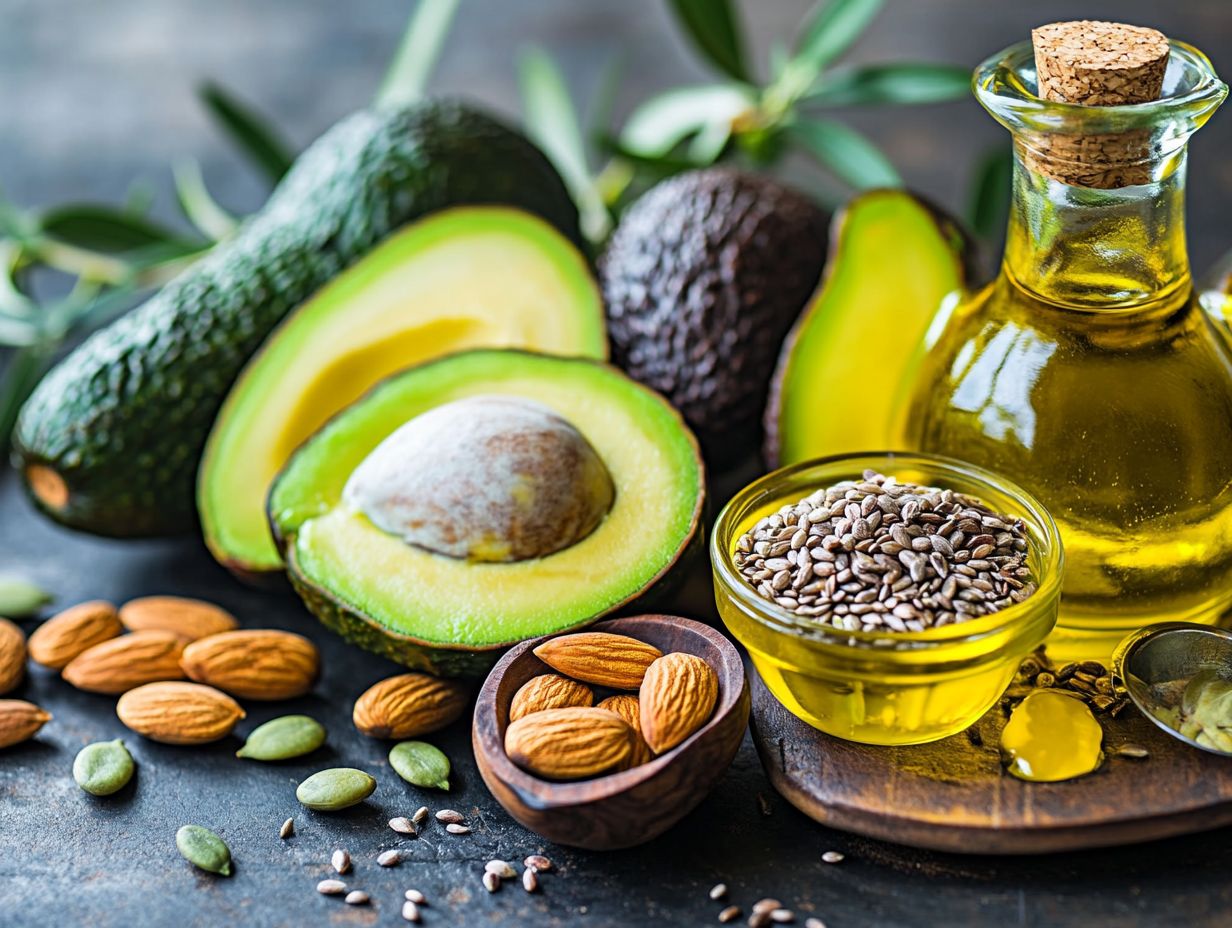
The top 10 healthy fats for your daily diet include avocado, olive oil, nuts and seeds, fatty fish, coconut oil, dark chocolate, tofu, whole eggs, chia seeds, and flaxseeds.
How do these healthy fats benefit your body?
Healthy fats provide essential nutrients and energy for the body. They support heart health, aid in weight management, and improve brain function and skin health.
Can these healthy fats be consumed on a daily basis?
Yes, these healthy fats can be included in your daily diet in moderate amounts. It is important to balance them with other food groups and not exceed the recommended daily fat intake.
Can these healthy fats be used in cooking?
Yes, many of these healthy fats such as olive oil, coconut oil, and avocado can be used for cooking at low to medium heat. However, some, like flaxseeds and chia seeds, are best consumed in their raw form.
Are there any potential risks or side effects of consuming these healthy fats?
While these healthy fats are generally safe and beneficial for the body, it is important to consume them in moderation. Excessive intake can lead to weight gain and other health issues. Additionally, individuals with certain medical conditions may need to limit their intake of specific types of healthy fats.
Can these healthy fats be a part of a weight loss diet?
Yes, incorporating healthy fats in your diet can actually aid in weight loss. They provide satiety and help control cravings, making it easier to stick to a calorie-controlled diet. However, it is important to monitor portion sizes and overall fat intake to see effective results.
Start incorporating healthy fats into your meals today and feel the difference!

